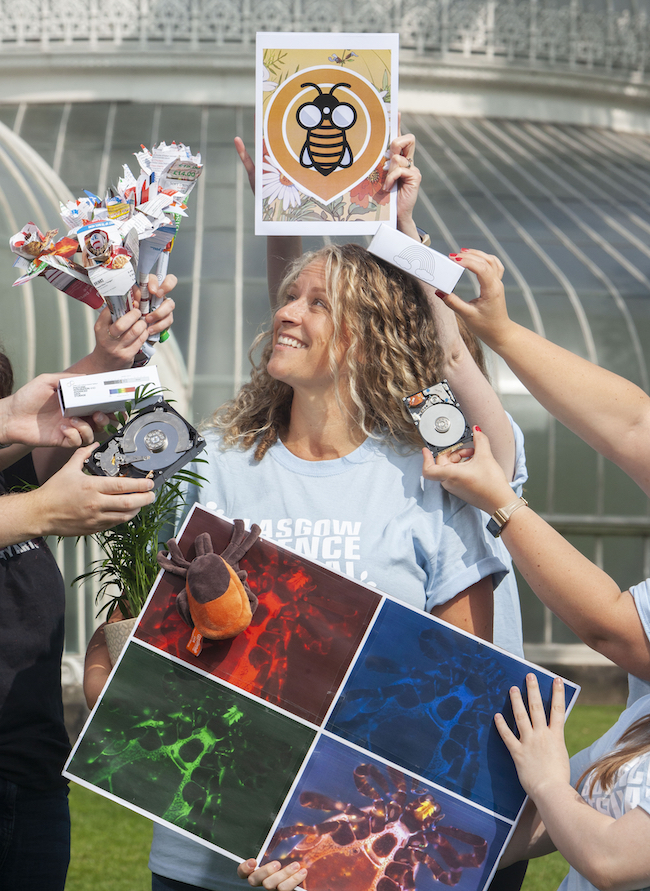In case you missed our announcement last week, the Glasgow Science Festival returns for the 16th annual festival, with an expanded programme of in-person and virtual events throughout June.
Visitors can look forward to a varied selection of wave-themed events, including investigations of gravitational wave astronomy, artist-led soundwalks, explanations of how different types of waves manifest in the natural world, and a striking sculpture of a basking shark made from e-waste.
This week, we sat down with the festival director, Dr. Deborah McNeill, for an exclusive GCOSI interview to discuss plans for the festival, the Glasgow City Region, and of course, science and innovation.

Dr. Deborah McNeill
Director, Glasgow Science Festival
What can attendees expect from ‘Glasgow’s Making Waves’?
“Glasgow Science Festival is back in our usual slot in June, with more than 50 in-person, wave-themed events. We will be appearing in a range of venues across the city including the Riverside, Kelvingrove and Hunterian Museums, Glasgow Botanic Gardens, the St Enoch Centre and 16 libraries! New venues for us this year include an appearance at The Big Feed, CommuniT in the Park (Elder Park) and the Unit. The events and activities are designed to appeal to a wide range of audiences, featuring our festival favourite family days, talks, walks, film, and exhibitions.”
What are the benefits of hosting a science festival to the Glasgow City Region and is there a further reach beyond the city?
“Glasgow has such a broad base of world leading research that it’s an incredible place to run a festival. I am absolutely spoiled for choice. We have always been able to respond to any requests from e.g. community groups around a specific topic of interest. Over the last 16 years of being festival director/ 20+ years in public engagement, I have built up an amazing network of talented and generous people who are excited to get involved in the development and delivery of the festival. Over the years we have welcomed dozens of partner organisations from across Scotland, the UK and the World into the programme.”
With the festival being delivered virtually in 2020, and socially distanced live events taking place last year. What have you learned over the past 2 years, and how will this change future festivals?
“We were days away from launching the GSF 2020 programme when COVID took hold. I took the decision to pivot to a digital festival in Sept that year and created ‘Science on the Sofa’ with only 7 weeks from start to finish. Despite timelines and people dealing with so much personally and professionally, almost every person I approached to collaborate said yes! So, I have always been incredibly grateful to my partners for sharing their time and expertise with me. The value of this was reinforced in such a tangible way.”
“The response to our digital offer was incredible, with participants from 96 countries and nearly 71K participants (mostly digital, some in person). The benefits in terms of accessibility to digital content has been well explored during COVID and I will maintain an online section as part of the festival. This takes the form of a self-service offer, with content available on the GSF website from 2nd to 30th June, so people can dip in at a time and pace of their choosing. Science on the Sofa this year features talks linked to our theme, citizen science projects and ‘Hands-Online’, which includes dozens of activities, experiments, workshops, quizzes etc. Suitable for families, schools, uniform, and youth groups. Anyone who wants to have a go at some fun science basically! We had some lovely feedback from a care home where residents with dementia had loved the messy, tactile nature of the activities.”
What does the future hold for Glasgow Science Festival?
“This is year 16 of Glasgow Science Festival. Here’s to many more.”
The Glasgow City Region has a talent for science and innovation, what is your favourite example of Glaswegian-based innovation?
“I’m not going to answer that. Instead, I invite you to visit Dennistoun Library throughout June to see an exhibition of work by three local primary schools, Alexandra Park, Golfhill & St Denis. I have posed this exact question (Scottish not just Glasgow) to the schools and the pupils are currently researching and designing their response to this.”
Explore the programme and book your tickets now at http://www.glasgowsciencefestival.org.uk/